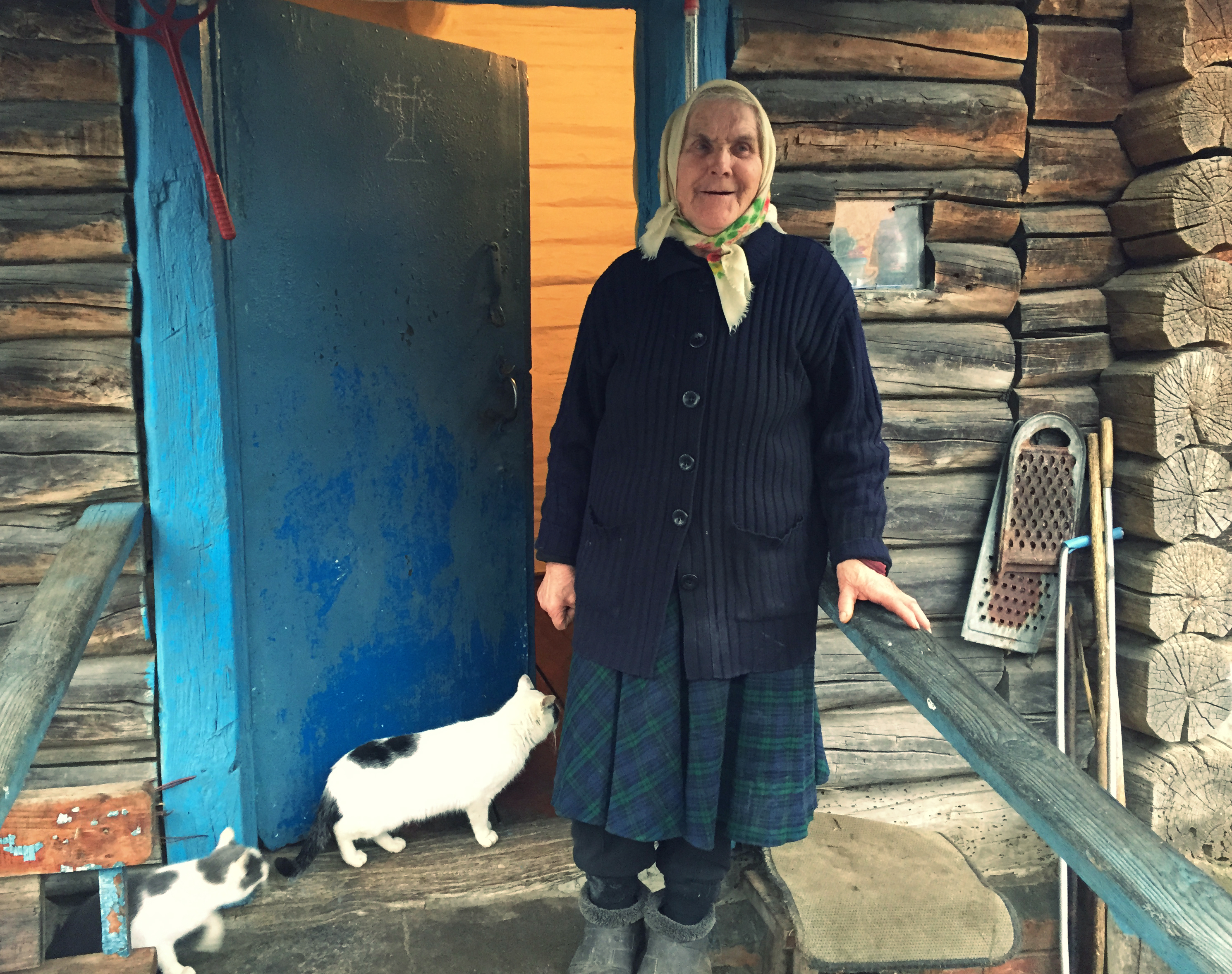KUPOVATOE, Ukraine — Ganay Zavorotnya, a Ukrainian babushka, lives on a muddy plot of land here that she shares with her sisters, Sonya and Marysya.
"I don't like visitors who don't accept my proposal to sit and eat in my house,” Zavorotnya, 84, said as I entered her three-room farmhouse in Kupovatoe, a village inside Chernobyl's Exclusion Zone. Then she planted a strong kiss on my right cheek.
I brought this grandmother some supplies as a gift — a bag of rice, cooking oil, sugar, a loaf of bread and a tin of condensed milk. The kiss was a greeting and a "thank you."
Her sisters sat snugly on a sofa in the corner, looking like wooden matryoshka, or Russian nesting dolls.
All three are self-settlers, older residents who returned to their evacuated villages inside the zone despite warnings from Ukraine's government not to do so.
![Living in the Exclusion Zone [video : 83100646]](http://videos.usatoday.net/Brightcove2/29906170001/2016/04/29906170001_4847443187001_Babushka.jpg?pubId=29906170001) They endure isolation, eerie silence and contaminated land so they can die in a place familiar to them. About 180 self-settlers in the zone are left, most of them women. They are dispersed across a 1,000-square-mile area of villages that continue to display scraps from the pastoral life that once dominated this area: farm tools, gardens, animal pens.
They endure isolation, eerie silence and contaminated land so they can die in a place familiar to them. About 180 self-settlers in the zone are left, most of them women. They are dispersed across a 1,000-square-mile area of villages that continue to display scraps from the pastoral life that once dominated this area: farm tools, gardens, animal pens.
The sisters’ neighbors include a half-dozen shabby outbuildings, five cats who Zavorotnya feeds but hasn't named and lands still contaminated by radiation.
![635964092510749636-Outbuilding-1.jpg [image : 83122484]](http://www.gannett-cdn.com/media/2016/04/16/USATODAY/USATODAY/635964092510749636-Outbuilding-1.jpg) When the accident happened, Zavorotnya and her husband — he died six years ago — were told to leave. Their son died at age 2 from appendicitis before Chernobyl happened.
When the accident happened, Zavorotnya and her husband — he died six years ago — were told to leave. Their son died at age 2 from appendicitis before Chernobyl happened.
"We were busy planting potatoes, and the head of the village council said to us: 'Get ready, you will be evacuated for three days.' He said to take some essentials. I thought we might spend the night in the forest, so I took some potatoes and two pillows," she said.
Nine months later they were back.
"I said to the authorities: 'You can shoot us, but we’re staying here.' Sometimes when I am asked how I got back, I say by helicopter," she said laughing.
Zavorotnya said she has no health problems from radiation. Her daughter and grandchildren live near Kiev. They are not frequent visitors.
The government agency that administers the zone has accepted that babushkas like Zavorotnya and her sisters will get their way in the end. It makes sure that doctors visit regularly and that they have adequate supplies. Once a year, on Easter Sunday, they are taken by bus to the city of Ivankiv, 33 miles away, so they can go to church.
![XXX GANAY_ZAVOROTNYA_3.JPG UKR [image : 83086306]](http://www.gannett-cdn.com/media/2016/04/15/USATODAY/USATODAY/635963254842026901-XXX-Ganay-Zavorotnya-3.JPG)
Shortly after the kiss, she shuffled to the kitchen and brought back some big pickles, a few half-eaten slices of cake and a large slab of white lard with black and pinkish streaks. Pig, probably. She started slicing it.
Before visiting the zone, I asked many scientists about what precautions to take. All agreed on one point: Don’t consume anything produced there, especially if it’s offered by a babushka. They grow vegetables and pick mushrooms from soil that still contains radioactive dust. If ingested, this can be particularly dangerous.
“Chickens. Ganay, earlier you said you kept some chickens. Can you show me them?” I said.
It worked. We were outside and she immediately became distracted when I asked how she kept busy when there was no one else around apart from her sisters. "Follow me," she said and led the way to a small stump and an ax next to a pile of logs. She picked up the ax and started swinging. "Before the accident," she said while chopping wood she uses to heat her house, "the nature here was so abundant and rich that people would come from far away to get potatoes."
Thump. Thump. Thump.
"I see a lot of deer around now, but what can I do with those? I am not a hunter," she said. "For people like me, the Zone is a motherland that can’t be replaced."
Thump. Thump.
"It has been a good year for apples."
Thump.
"And now, let’s go eat," she said.

![babushka_chernobyl [image : 82888128]](http://www.gannett-cdn.com/media/2016/04/11/USATODAY/USATODAY/635959666688798069-Ganay-Zavorotnya-DOOR-ADJUSTED.jpg)

